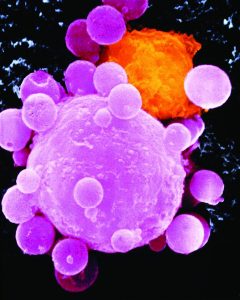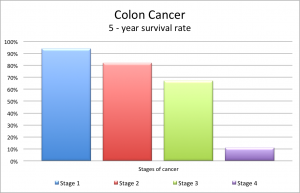
A dividing lung cancer cell. Source: National Institues of Health
The Canadian Cancer Statistics estimated approximately 206,200 Canadians will be diagnosed with cancer in 2017 and 80,800 Canadians will die of cancer in 2017. In other words, about 1 in 2 Canadians will develop cancer in their lifetime, and about 1 in 4 Canadians will die of cancer. However, a cancer diagnosis fortunately does not mean a death sentence since the majority of cancers can be treated successfully if detected early. Cancer is a group of diseases characterized by the uncontrolled growth and spread of abnormal cells. If the cancer has spread, treatment becomes more difficult, and generally a person’s chances of surviving are much lower. Thus, the key to curing cancer is early detection.

Colon cancer 5-year survival rate. Data from Vogelaar et al.
For example, in colon cancer, if you detect cancer in stage four, only 11 percent of the people survive for five years. However, if you are able to detect this cancer early at stage one, over 94 percent of people will survive. Other types of cancers also have similar trends. However, unfortunately only 15 percent of people are detected at stage one, whereas the vast majority, 70 percent, are detected in stages three and four.
There are currently three best ways to screen for cancer. The first method is a medical procedure of colonoscopy for colon cancer. The second is a protein biomarkers, prostate-specific antigen(PST), test for prostate cancer. The third one is an imaging technique, mammography for breast cancer. However, they are highly invasive and require a large infrastructure to implement.
So, many scientists have researched to find better detection mechanisms for cancers, which is noninvasive, light in infrastructure, and highly specific. Dr. Jimmy Lin, a geneticist, and his research team have developed extremely sensitive blood tests, which can accurately detect the earliest traces of cancer DNA in the bloodstream. Even this technique does not use any radiation and is applicable to large population.
The blood circulatory system is crucial for us to survive, providing oxygen and nutrients to our cells, and removing waste and carbon dioxide. When cancer cells grow and die, DNA is shed into the blood system. Based on genomic sequencing technology, they were able to scan blood for fragments of DNA shed by cancers to detect these cancers early.
This technology was actually used to detect recurrence of cancers earlier than with conventional methods. As a result, the technique accurately predicted relapse in 12 of 15 patients about eight months before cancers were visualized by standard imaging method. Patients, who still have cancer DNA in the bloodstream, are at high risk of developing relapse since cancer cells that survive treatment can invade other organs as metastatic disease.
This means that the patients can get surgical intervention or therapies eight months earlier. More importantly, it means that the cancer would have grown and spread for eight months less, which is the matter of life and death for some patients. For some patients, this technique also discovered mutations that potentially causes drug resistance, which could help doctors to prescribe drugs to fight against specific mutations.
-Subi Kim
Source:
- Vogelaar, I. L., Ballegooijen, M., Zuber, A. G., Habbema, J. D., Kuipers, E. J. Effect of rising chemotherapy costs on the cost savings of colorectal cancer screening. JNCL, 2009, 20, 1412-1422. (accessed Mar 17, 2018).
- Canadian Cancer Society’s Advisory Committee on Cancer Statistics. Canadian Cancer Statistics. 2017, www.cancer.ca/Canadian-CancerStatistics-2017-EN.pdf (accessed Mar 17, 2018).
- National Institutes of Health. Cancer. 2018, https://www.nih.gov/about-nih/what-we-do/nih-turning-discovery-into-health/cancer (accessed Mar 17, 2018).
- Bardelli, A. Medical research: L Personalized test tracks cancer relapse. Nature. 2017, 545, 417-418. https://www.nature.com/articles/545417a (accessed Mar 17, 2018).
- Mendoza, J. Blood Test Catches Relapse in Early-Stage Breast Cancer Patients. AAAS. 2015. https://www.aaas.org/news/blood-test-catches-relapse-early-stage-breast-cancer-patients (accessed Mar 17, 2018).
- Murillas et al. Mutation tracking in circulating tumor DNA predicts relapse in early breast cancer. Science Translational Medicine. 2015, 7. http://stm.sciencemag.org.ezproxy.library.ubc.ca/content/scitransmed/7/302/302ra133.full.pdf (accessed Mar 17, 2018).
